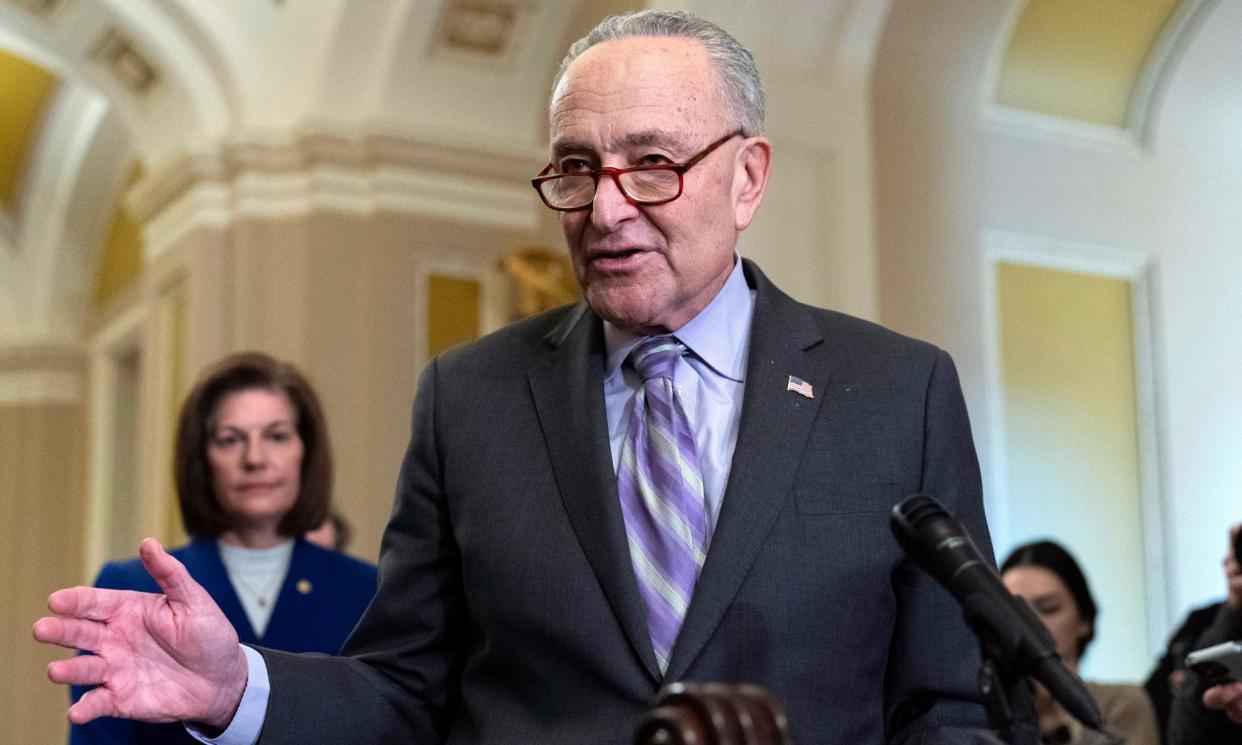Senate blocks bipartisan $118bn bill on US-Mexico border and Ukraine

The Senate blocked a bipartisan border and national security bill from advancing on Wednesday, as Democrats accused Republicans of bending to the political wishes of Donald Trump at the expense of their constituents.
The vote was 49 to 50, with 45 Democrats and four Republicans supporting the bill’s advancement. Sixty votes were needed to begin debate on the bill.
Most of the Republican conference opposed the bill’s advancement after complaining that the legislation did not go far enough in addressing the needs at the US-Mexico border, where arrests for illegal crossings have hit record highs. Five members of the Democratic caucus also voted to block the bill, out of concern about the severity of the border-security measures and the added funding for Israel’s military amid the war in Gaza.
Related: House Republicans fail to impeach Biden’s homeland security secretary
The Senate majority leader, Chuck Schumer of New York, initially supported the bill’s advancement but then changed his vote – a procedural maneuver that would allow the chamber to revisit the proposal in the future.
With the border deal dead, the Senate attempted to advance a separate foreign aid package that would include only the funding for US allies outlined in the bipartisan bill. There was some apparent confusion over how much support that bill had, forcing senators to keep an initial vote on the proposal open for four hours as they debated the best path forward.
When the vote finally closed on Wednesday evening, 58 out of 100 senators were on record supporting the bill’s advancement. But 60 votes will ultimately be required to approve the bill, so it currently lacks the necessary support to pass the Senate. Taking to the Senate floor on Wednesday evening, Schumer announced the chamber would reconvene Thursday to vote on the bill again.
“We will recess until tomorrow and give our Republican colleagues the night to figure themselves out,” Schumer said. “We’ll be coming back tomorrow at noon, and hopefully that will give the Republicans the time they need. We will have this vote tomorrow.”
However, it remained deeply unclear whether a foreign aid package without border measures could pass the Senate, which considered a similar proposal back in December. Republicans, who insisted that the legislation must address the border, previously blocked that package from advancing.
The $118bn bipartisan bill would have granted the president a new power to shut down the border when daily crossings pass a certain limit while also expediting the asylum review process, which could have led to quicker deportation for many migrants. The bill would have provided $60bn in military assistance for Ukraine, $14bn in security assistance for Israel and $10bn in humanitarian assistance for civilians affected by wars in Ukraine, and Gaza and the West Bank.
Some hard-right Republicans had already indicated that they would oppose the standalone bill, demanding more concessions from Democrats on border policy. Senator Mike Lee, a Republican of Utah, said members of his party should not approve the bill without “language conditioning any Ukraine funds on the achievement of border-security benchmarks”.
On Tuesday, Mike Johnson, the Republican House speaker, had tried to pre-empt a potential foreign aid package by holding a vote on a bill that would only provide funding to Israel. The bill was designed to appeal to hard-right Republicans, who have grown increasingly resistant to Ukraine funding, but the House voted it down on Tuesday evening.
In a pointed speech delivered at the White House on Tuesday, Joe Biden blamed the border bill’s expected failure on Trump, who had encouraged Republicans to oppose the deal. Writing on his social media platform Truth Social on Monday, Trump dismissed the bill as “nothing more than a highly sophisticated trap for Republicans to assume the blame on what the Radical Left Democrats have done to our Border, just in time for our most important EVER Election”. Echoing Trump’s concern about the impact that the bill’s passage could have on the presidential race, some Republican lawmakers have suggested border security should not be addressed until after the November election.
“All indications are this bill won’t even move forward to the Senate floor. Why? A simple reason: Donald Trump. Because Donald Trump thinks it’s bad for him politically … He’d rather weaponize this issue than actually solve it,” Biden said on Tuesday. “Every day between now and November, the American people are going to know that the only reason the border is not secure is Donald Trump and his Maga [Make America great again] Republican friends.”
